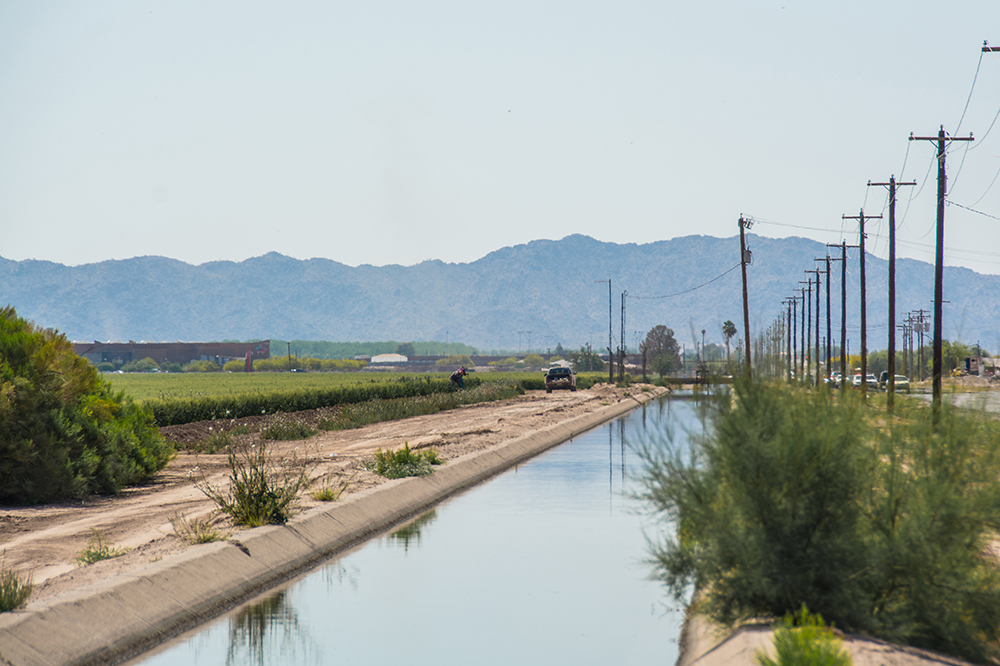
The Ak-Chin Indian Community is taking the Central Arizona Water Conservation District to court after the authority said it would begin denying the tribe access to water guaranteed to them by federal mandate.
Ak-Chin filed suit against the regional water authority on March 28 in an effort to regain access to a substantial amount of water promised to the tribe as part of the Ak-Chin Water Rights Settlement Act of 1984.
“We’re continuing to grow and expand,” Ak-Chin Chairman Robert Miguel said. “So, it’s key that we get every ounce of that water, not just for today, but for the future.”
The nearly 33-year-old congressional act promises the community 75,000 acre-feet of water every year from the Central Arizona Project aqueduct, plus an additional 10,000 acre-feet when “sufficient surface water” and “canal capacity” allow.
This language specifically is the source of contention between the tribe and the CAWCD.
Ak-Chin and CAWCD have, in the past, tentatively agreed on the definition of these terms. However, this year CAWCD decided to challenge both the tribe’s and the federal government’s understanding of the settlement by denying the tribe, in perpetuity, access to the additional 10,000 acre-feet outlined in the settlement.
The tribe responded to the challenge by filing the suit, which seeks two remedies.
First, Ak-Chin is seeking “a declaration of its federal water rights under the 1984 Act and CAWCD’s obligations with respect to those rights.”

Second, the tribe is seeking injunctive relief “ordering CAWCD to schedule for delivery and deliver to Ak-Chin or its designees the § 2(b) water during any and every year that Ak-Chin requests the delivery of such water and the Secretary determines that the necessary water and canal capacity are available.”
The importance of water is hardly lost within a community of native desert-dwelling people. Their very name – Ak-Chin – is an O’odham word meaning “mouth of the wash.” Historically, the mouth of the wash is where the tribe did most of its farming.
Today the community has varied economic interests. However, agriculture through Ak-Chin Farms is still an essential revenue generator, Miguel said.
Ak-Chin constantly has been expanding and diversifying its agricultural production, shifting from more draught-resistant cotton to the thirstier potatoes, corn and alfalfa.
The chairman acknowledged the permanent nature of the settlement saying, “the only way it [water rights] can be taken away is through an act of Congress.” However, he said if CAWCD can successfully challenge the tribe for these 10,000 acre-feet, then “how secure is our other 75,000 acre-feet of water?”
Jay Johnson, attorney for CAWCD, said despite past efforts by all parties to work through their disagreements, CAWCD remains concerned about the ambiguity of language within the settlement and is willing to challenge it to get precise legal definitions of the terms.
“We have resolved this on a year-by-year basis up to this point, and we need to have a definitive answer to resolve this permanently going forward,” Johnson said.
Johnson would not offer any comment on how CAWCD defines the terms “sufficient surface water” and “canal capacity,” or if they have plans to attempt to further limit Ak-Chin’s access to CAP water. However, Johnson did seem to welcome the opportunity to have a more well-defined statute.
“Because we have not been able to reach an agreement amongst the parties about what that language means, we are now throwing it to the court to make a decision for us,” Johnson said. “We need to have clarity so that this agreement can be put behind us.”
This is only one of several recent incidents in which native water rights have been challenged by regional, state or federal entities.
A conflict between the Standing Rock Sioux and U.S. Army Corps of Engineers received national attention when a massive protest mounted in opposition to the construction of an oil pipeline that crosses the Missouri River upstream from the reservation. Opponents say the pipeline poses a potential ecological threat to a waterway the tribe relies on for irrigation and drinking water.
Elsewhere, positive advances in water rights security have been made for other tribes.
The recently-negotiated Water Infrastructure Improvements for the Nation Act, signed in December 2016, earmarked $422 million in water infrastructure improvements for the Blackfeet tribe of Washington, and secured a right of use for both the Choctaw and Chickasaw nations in Oklahoma.
This story appears in the May issue of InMaricopa.


![3 things to know about the new city budget Vice Mayor Amber Liermann and Councilmember Eric Goettl review parts of the city's 2024 operational budget with Mayor Nancy Smith on April 24, 2024. [Monica D. Spencer]](https://www.inmaricopa.com/wp-content/uploads/2024/04/spencer-042424-preliminary-budget-meeting-web-218x150.jpg)






![MHS G.O.A.T. a ‘rookie sleeper’ in NFL draft Arizona Wildcats wide receiver Jacob Cowing speaks to the press after a practice Aug. 11, 2023. [Bryan Mordt]](https://www.inmaricopa.com/wp-content/uploads/2024/04/cowing-overlay-3-218x150.png)



![Alleged car thief released without charges Phoenix police stop a stolen vehicle on April 20, 2024. [Facebook]](https://www.inmaricopa.com/wp-content/uploads/2024/04/IMG_5040-218x150.jpg)

![3 things to know about the new city budget Vice Mayor Amber Liermann and Councilmember Eric Goettl review parts of the city's 2024 operational budget with Mayor Nancy Smith on April 24, 2024. [Monica D. Spencer]](https://www.inmaricopa.com/wp-content/uploads/2024/04/spencer-042424-preliminary-budget-meeting-web-100x70.jpg)



The tribe has been a good neighbor to Maricopa for many years. Not keeping the agreements that were made doesn't reflect very well on CAWCD or the State of Arizona. This is a hard-working tribe that has been self-sustaining through their farming. In addition, they have been generous to our combined community with revenue for Maricopa schools as well as in other areas.
Playing word games with a promise is not what I see as the ethical thing to do.